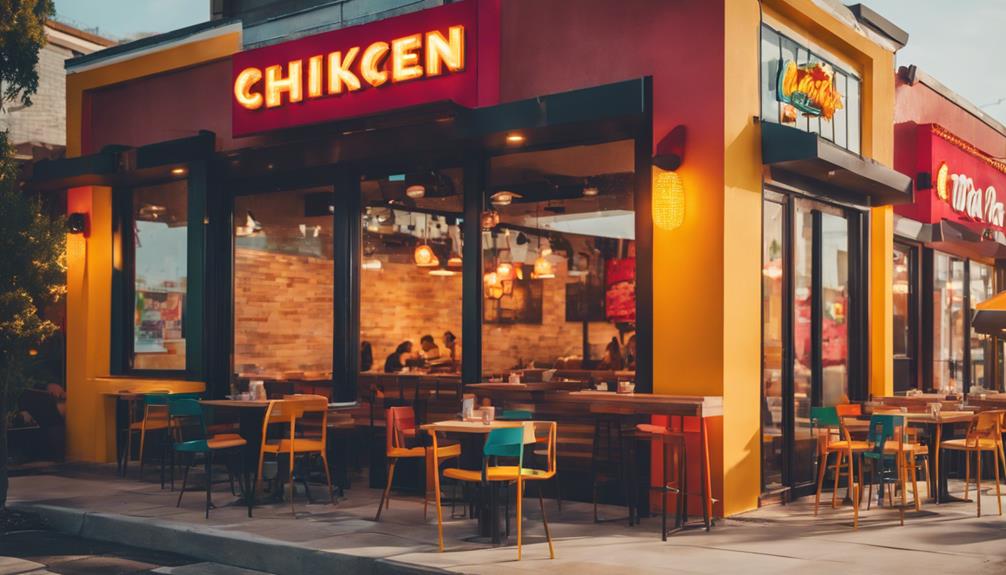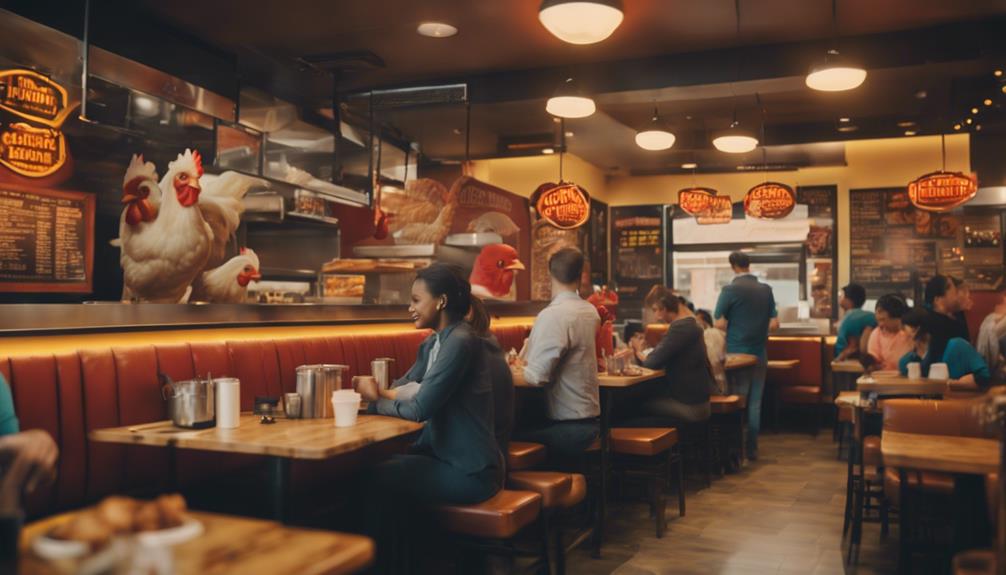The chicken franchise market presents exciting avenues for entrepreneurs looking to invest in a profitable sector. With strong brand recognition and extensive menu options, potential franchisees can attract a diverse customer base. Commitment to quality ingredients appeals to health-conscious diners, while tailored training programs guarantee franchisee success. Ongoing support, including marketing assistance, enhances operational efficiency. Initial investment costs vary, but financing options make entry more accessible. As the market evolves, innovative flavors and creative marketing strategies allow franchises to thrive. Those enthusiastic to uncover the vast possibilities ahead should look closer at what this vibrant industry offers.
Key Elements

The key elements of a chicken franchise opportunity include an in-depth company overview, a solid business framework, and essential information for prospective franchisees.
Understanding these components helps potential investors gauge the viability and support they can expect.
Company Overview
Franchises in the chicken industry offer a diverse range of menu options, unique selling propositions, and varying initial investment costs, attracting a wide array of potential franchisees.
Key elements of these companies often include strong brand recognition, extensive training programs, and robust support systems.
Many franchises emphasize quality ingredients and innovative recipes, appealing to health-conscious consumers.
Additionally, these companies typically maintain a commitment to community engagement, fostering customer loyalty.
Most franchises also provide ongoing marketing and operational assistance, ensuring franchisees have the tools needed for success.
With a multitude of choices available, aspiring franchisees can find opportunities that align with their personal goals and investment capabilities, making the chicken franchise sector an enticing option for entrepreneurs.
Business Overview
Key elements of successful chicken franchises include strong brand recognition, extensive training, and ongoing operational support for franchisees.
These franchises often boast a well-defined menu that caters to diverse customer preferences, ensuring they remain competitive in a growing market.
In addition, effective marketing strategies leverage social media and localized promotions to build community engagement and attract a loyal customer base.
Efficient supply chain management is essential, allowing franchises to maintain quality and consistency in their offerings.
Moreover, understanding customer demographics helps these businesses adapt to trends, such as the increasing demand for healthier options.
Ultimately, a combination of innovation, support, and market awareness drives success in the chicken franchise industry.
Information for Franchisees
Successful franchisees benefit from extensive support systems that include training, marketing assistance, and operational guidance.
These franchises provide thorough training programs tailored to equip owners with essential skills for success. Ongoing marketing support helps franchisees navigate competitive landscapes, ensuring brand visibility and customer engagement.
Access to proprietary recipes and supply chains streamlines operations, allowing franchisees to maintain quality and consistency. Assistance with site selection and store design maximizes potential for profitability.
Additionally, a network of franchisee peers offers shared experiences and valuable insights. With a focus on collaboration and continuous improvement, these elements create a robust foundation for franchisees, greatly enhancing their chances of achieving long-term success in the chicken franchise industry.
Company Overview

The company overview of leading chicken franchises highlights their inception, growth, and market impact.
It showcases their purpose and goals, along with the experience of their executive teams.
Additionally, an analysis of franchise market share reveals their competitive positions in the industry.
Franchise Inception and Growth Timeline
Franchise inception and growth timelines reveal how various chicken franchises have evolved, from their humble beginnings to becoming recognized brands in the fast-casual dining landscape.
Brands like KFC and Popeyes started with single locations, gradually expanding through innovative menu offerings and strategic marketing.
Wingstop's rapid growth can be attributed to its focus on flavor and quality, while Raising Cane's has thrived with a streamlined menu emphasizing chicken fingers.
Slim Chickens and Zaxbys have carved their niches by catering to health-conscious consumers and local communities.
Each franchise's journey illustrates the importance of adapting to market trends, customer preferences, and operational efficiencies, solidifying their positions as key players in the competitive chicken franchise sector.
Franchise Purpose and Goals
Many chicken franchises aim to deliver exceptional dining experiences while fostering community engagement and promoting brand loyalty through quality food and service. Their purpose often revolves around creating a unique atmosphere where customers feel valued and connected.
These franchises focus on using fresh ingredients and innovative recipes to guarantee customer satisfaction. Additionally, they endeavor to build strong relationships with their local communities, participating in events and supporting local causes.
The overarching goal is to maintain a loyal customer base by consistently exceeding expectations, which in turn drives profitability. By prioritizing both customer experience and community involvement, these franchises position themselves as an essential part of the neighborhoods they serve, ultimately enhancing their brand reputation and growth potential.
Executive Team Experience
With a diverse range of backgrounds in the food and hospitality industry, the executive teams of chicken franchises bring valuable expertise to drive growth and innovation. These leaders often possess extensive experience in operations, marketing, and financial management, ensuring that franchises are well-positioned in a competitive market.
Their collective knowledge allows for the development of effective strategies that enhance brand visibility and customer loyalty. Many team members have previously held executive roles in successful restaurant chains, which equips them to navigate industry challenges effectively.
This wealth of experience fosters an environment of support and guidance for franchisees, enabling them to thrive in their ventures. Ultimately, strong leadership is essential for sustaining long-term success in the chicken franchise landscape.
Franchise Market Share Analysis
The chicken franchise market is dominated by key players like KFC, Popeyes, and Wingstop, each capturing significant shares through unique offerings and strong brand loyalty.
KFC leads with over 3,872 U.S. units, offering comfort food and bucket meals. Popeyes follows closely, boasting 2,786 locations and its famous New Orleans-style fried chicken. Wingstop, with 1,618 units, emphasizes flavor and quality through its hand-cut fries and diverse sauces.
Other contenders like Raising Cane's and Zaxby's are also expanding their presence, focusing on niche markets. The competitive landscape is further enriched by franchises such as Bojangles and Slim Chickens, which capitalize on specialty items and regional flavors.
This vibrant market appeals to diverse consumer preferences and continues evolving.
Brand Identity

Brand identity plays an essential role in the success of chicken franchises, especially among millennials who seek unique dining experiences.
These franchises prioritize customer-centric service, ensuring that every interaction fosters loyalty and satisfaction.
Additionally, signature sauces and marinades set them apart, creating memorable flavors that keep customers coming back for more.
Franchise Popularity Among Millennials
Franchises that embrace unique brand identities and resonate with millennials often see increased loyalty and engagement from this demographic.
Millennials prioritize authenticity and meaningful connections, making it essential for brands to communicate their values clearly.
Fast-casual chicken franchises that showcase transparency in sourcing ingredients and emphasize sustainability typically attract this audience.
Creative marketing strategies, particularly on social media, amplify brand visibility and foster community interaction.
Additionally, offerings that cater to health-conscious preferences and global flavors further enhance appeal.
Customer-Centric Service Commitment
Focusing on customer-centric service commitment helps chicken franchises build a strong brand identity that resonates with today's discerning diners. By prioritizing customer satisfaction, these franchises cultivate loyalty and positive word-of-mouth.
They train staff to engage warmly and effectively, ensuring every guest feels valued. Quick response times to inquiries and concerns further enhance the dining experience, making customers more likely to return.
Additionally, franchises actively solicit feedback, adapting their offerings based on customer preferences. This responsiveness not only improves service but also fosters a community around the brand.
In a competitive market, such dedication to exceptional service distinguishes chicken franchises, appealing to both existing and prospective customers who seek quality and care in their dining choices.
Signature Sauces and Marinades
Crafting signature sauces and marinades not only enhances the flavor profile of chicken dishes but also solidifies a franchise's unique identity in a crowded market.
These distinctive flavors create memorable dining experiences, encouraging customer loyalty and repeat visits. Franchises that invest in developing their own sauces can differentiate themselves from competitors, appealing to diverse palates and dietary preferences.
By incorporating local or global inspirations, they can attract a wider audience seeking authenticity and innovation. Regularly updating sauce offerings keeps the menu fresh and exciting, catering to evolving consumer tastes.
In this competitive landscape, a franchise's ability to showcase its brand through signature sauces can be a powerful marketing tool, fostering a strong connection with customers.
Information for Franchisees

For aspiring franchisees, understanding the initial costs, support structures, and market dynamics is essential to making informed investment decisions. Each chicken franchise offers a unique combination of fees, training, and ongoing support.
Many franchises provide detailed training programs, operational guidance, and access to proprietary recipes, ensuring franchisees feel equipped to succeed. Additionally, franchisees benefit from a network of peers, fostering shared experiences and advice.
Market trends indicate a growing demand for fast-casual dining, emphasizing unique flavors and health-conscious options. By conducting thorough market research and evaluating potential locations, franchisees can position themselves for success in this competitive landscape.
Ultimately, informed choices lead to profitable outcomes and sustainable growth in the chicken franchise industry.
Financial Requirements & Ongoing Fees

When considering a chicken franchise, potential investors need to understand the financial landscape.
Initial franchise fees can range considerably, with costs starting around $50,000 and total investments varying from $383,500 to over $3 million.
Ongoing fees, including royalties and marketing contributions, also play an essential role in the overall financial commitment.
Investment Range: $383,500 – $3,545,800
Investing in a chicken franchise can require a substantial financial commitment, with initial costs ranging from $383,500 to $3,545,800, depending on the brand and location. This investment generally includes franchise fees, equipment, leasehold improvements, and working capital.
Each franchise brand has its own financial requirements, impacting potential profitability and return on investment. For instance, well-known brands like Popeyes and KFC fall on the higher end of the spectrum, while others like Champs Chicken present more affordable options.
Franchisees should carefully evaluate their financial readiness and consider financing options available through franchisor partnerships. Conducting thorough market research is essential to guarantee a sound investment that aligns with personal and financial goals.
50,000 Initial Franchise Investment
Understanding the initial franchise investment involves not only the upfront costs but also ongoing fees that franchisees must anticipate as part of their financial commitment.
For many chicken franchises, the initial franchise fees can range considerably, from as low as $0 with brands like Champs Chicken and Chesters to around $50,000 for franchises like Popeyes and Chicken Salad Chick.
Total investments vary, often encompassing equipment, leasehold improvements, and working capital, which can reach millions depending on the franchise.
Franchisees should also consider potential financing options available through franchisor partnerships.
Ongoing Percentage of Sales
Many chicken franchises require franchisees to pay an ongoing percentage of sales as part of their financial commitments, which typically ranges from 4% to 8% of gross sales.
This fee is vital for maintaining brand standards, providing ongoing support, and funding collective marketing efforts.
Franchisees should carefully evaluate these percentages when considering their potential profitability, as higher percentages can greatly impact net income.
It's important to factor in these ongoing fees alongside initial costs and operational expenses.
Understanding these financial obligations helps franchisees make informed decisions and plan effectively for long-term success within their chosen franchise system.
Marketing Contribution Percentage
Franchisees often contribute a marketing percentage, usually ranging from 1% to 5% of gross sales, to support brand promotion and advertising initiatives. This contribution plays an essential role in maintaining the brand's visibility and competitiveness in a crowded market.
By pooling resources, franchisees can benefit from coordinated marketing campaigns, which often yield better results than individual efforts. Additionally, this collective funding enables franchises to engage in larger-scale promotions, digital marketing, and community outreach.
The marketing contribution is typically outlined in the franchise agreement, ensuring transparency and mutual understanding. As franchisees invest in marketing, they not only enhance their brand but also increase their potential for attracting customers and driving sales.
Royalties and Operational Expenses
Royalties and operational expenses are crucial financial requirements that franchisees must manage to guarantee the ongoing success and profitability of their chicken franchises.
Typically, franchisees pay a percentage of their monthly sales as royalties, which can range from 4% to 7%. This fee supports brand marketing, training, and ongoing operational assistance.
Additionally, franchisees should anticipate operational expenses, including rent, utilities, supplies, and labor costs. These expenses can vary considerably based on location and the franchise's specific requirements.
Careful financial planning is essential, as these ongoing fees can impact profitability. By understanding and effectively managing these costs, franchisees can position their businesses for long-term success while maximizing their returns on investment.
Financing Options

When exploring financing options for a chicken franchise, potential franchisees should consider various assistance programs offered by franchisors.
Alternative funding sources, such as private investors or crowdfunding platforms, can also provide necessary capital.
Additionally, government-backed loan providers are available to help aspiring owners secure the funding they need to start their businesses.
Franchisee Financing Assistance Options
Several financing options are available to help prospective franchisees manage the initial investment costs associated with opening a chicken franchise.
Many franchisors offer direct financing assistance, allowing franchisees to spread payments over time.
Additionally, banks and credit unions often provide loans specifically tailored for franchise investments, considering the franchise's established brand reputation.
Some franchisees might also explore Small Business Administration (SBA) loans, which typically offer lower interest rates and longer repayment terms.
Personal savings and investments can serve as another source of capital.
Ultimately, evaluating these financing alternatives helps franchisees choose the best strategy to fund their chicken franchise and guarantee a successful launch.
Alternative Funding Sources Available
Exploring alternative funding sources can provide franchisees with additional options to secure the necessary capital for starting their chicken franchise.
Many entrepreneurs consider crowdfunding platforms, which allow them to raise small amounts from numerous backers, creating a community invested in their success.
Peer-to-peer lending is another option, connecting borrowers directly with individual investors, often at lower interest rates than traditional banks.
Additionally, personal savings and funds from family or friends can serve as valuable sources of capital.
Some franchisees also explore microloans, which cater specifically to small businesses and startup needs.
Government-Backed Loan Providers
Government-backed loan providers offer franchisees favorable financing options to help secure the necessary capital for their chicken franchise ventures. These loans typically feature lower interest rates and longer repayment terms, making them an attractive choice for aspiring franchise owners.
Programs like the Small Business Administration (SBA) 7(a) loan can provide funding up to $5 million, helping cover initial franchise fees and startup costs. Additionally, these loans often require less collateral compared to traditional financing, easing the burden on new entrepreneurs.
Training & Support Offered

When considering a chicken franchise opportunity, training and support play an essential role in ensuring success.
Franchisees receive thorough onboarding to familiarize them with the business model, along with continuous skill enhancement programs to keep their teams sharp.
Access to operational training materials further equips owners with the tools they need to thrive in a competitive market.
Comprehensive Onboarding for Franchisees
Thorough onboarding for franchisees includes extensive training programs, operational support, and access to proprietary recipes, ensuring they're well-equipped for success from day one.
Franchisees receive hands-on training covering all aspects of running their business, from kitchen operations to customer service. The support extends beyond initial training, offering ongoing guidance on marketing strategies and operational efficiencies.
Franchisees also gain access to a robust network of fellow operators, fostering collaboration and shared experiences. This all-encompassing approach not only boosts their confidence but also enhances their ability to navigate challenges in the fast-paced food industry.
With dedicated support, franchisees can focus on delivering quality service and building a loyal customer base right from the start.
Continuous Skill Enhancement Programs
Franchisees benefit from ongoing skill enhancement programs that focus on refining operational efficiency and adapting to industry trends. These programs are designed to keep franchisees and their teams up-to-date with best practices and innovative strategies.
Regular workshops and seminars provide insights into market developments, customer preferences, and effective management techniques. Additionally, franchisees receive tailored support that addresses their unique challenges and fosters a culture of continuous improvement.
This commitment to skill enhancement not only empowers franchisees to excel but also enhances the overall customer experience. By investing in their growth, franchisors guarantee that their franchisees can navigate the dynamic food industry with confidence and success, ultimately contributing to the brand's reputation and profitability.
Operational Training Materials Available
Utilizing extensive operational training materials, franchisees gain essential knowledge and skills to effectively manage their businesses from day one. These materials often include detailed manuals covering everything from food preparation to customer service protocols, ensuring consistency across all locations.
Additionally, interactive online modules and hands-on workshops provide practical learning experiences. Franchisees also benefit from ongoing support, including refresher courses and updates on operational best practices.
Access to proprietary recipes and supply chain information further enhances their ability to deliver high-quality products. This robust training framework not only prepares franchisees for immediate success but also fosters long-term growth and adaptability in a dynamic market.
With such resources, franchisees feel confident maneuvering operational challenges.
LEGAL AND REGULATORY

Understanding legal and regulatory requirements is vital for anyone considering a chicken franchise.
Franchisees must navigate compliance with local, state, and federal laws, which can greatly impact their operations.
A thorough legal compliance guide helps franchisees avoid pitfalls and guarantees their business runs smoothly.
Franchise Legal Compliance Guide
Franchisees must pay close attention to legal obligations and key sections of the franchise agreement. Understanding these elements not only guarantees compliance but also protects their investment.
It's essential for franchisees to familiarize themselves with regulations that govern their operation.
Key Sections to Review
Legal compliance is essential for franchise operations, as it guarantees adherence to federal and state regulations governing franchise agreements and business practices.
Franchisees should review critical sections such as disclosure documents, operating manuals, and compliance checklists.
Understanding these components helps ascertain smooth operations, mitigates legal risks, and supports franchisees in meeting their obligations while fostering a successful business relationship with the franchisor.
Legal Obligations
Complying with legal obligations is essential for franchise success, as it guarantees adherence to the specific regulations and standards set forth by both federal and state authorities.
Franchisees must familiarize themselves with franchise disclosure documents, trademark protections, and health regulations.
Regular audits and compliance checks verify that operations meet legal standards, protecting the franchise's reputation and minimizing potential liabilities.
MARKET ANALYSIS

The market for chicken franchises is increasingly shaped by health-focused menu innovations, appealing to consumers who prioritize nutritious options.
Millennials and families are driving demand for convenience, seeking quick dining solutions that fit their busy lifestyles.
As these trends evolve, franchise opportunities that adapt to these preferences are likely to thrive.
Health-Focused Menu Innovations
In today's market, health-conscious consumers are driving chicken franchises to innovate their menus with lighter, nutritious options.
These changes not only cater to dietary preferences but also position franchises for significant sales growth in a competitive landscape.
Health-Conscious Menu Innovations
Health-conscious menu innovations are increasingly shaping the offerings of chicken franchises, reflecting a growing consumer demand for nutritious and flavorful dining options.
Franchises are incorporating grilled chicken, fresh salads, and low-calorie sauces to cater to health-savvy diners.
Customizable meals allow customers to accommodate dietary restrictions, while seasonal ingredients enhance freshness.
These changes not only attract health-focused consumers but also keep the menu exciting and relevant.
Sales Growth Predictions
Sales growth for chicken franchises will likely surge as consumers increasingly prioritize health-focused menu innovations that align with their wellness goals.
As diners seek nutritious options, franchises introducing grilled items, salads, and customizable meals will thrive.
This shift in consumer preferences not only boosts sales but also enhances brand loyalty, positioning these franchises favorably in a competitive fast-casual dining landscape.
Millennials and Families Seeking Convenience
Millennials and families increasingly prioritize convenience in their dining choices, shaping the fast-casual landscape.
Consumer preference surveys reveal a strong desire for quick, accessible meal options that fit busy lifestyles.
This trend highlights the importance of franchises that cater to these target audiences, offering both quality and efficiency.
Target Audience Characteristics
Convenience drives the dining choices of modern families and younger consumers, who increasingly seek quick and satisfying meal solutions amid their busy lifestyles.
These target audiences prioritize speed and quality, often opting for fast-casual dining.
Health and unique flavors also play significant roles in their preferences, as they look for nutritious options that fit their fast-paced routines while still being enjoyable for the entire family.
Consumer Preference Surveys
Recent surveys reveal that a significant majority of families prioritize quick dining options that offer both quality and unique flavors, reflecting their fast-paced lifestyles.
Millennials, in particular, seek convenience without compromising taste.
This shift in consumer preferences drives demand for franchises that provide diverse menus, fast service, and healthy choices, making chicken franchises an attractive investment for savvy entrepreneurs.
EXIT STRATEGY

When considering an exit strategy, franchisees need to understand the specifics of the buyback program and transfer guidelines.
Knowing how to navigate these options can markedly affect the change process and potential financial returns.
It's essential for franchisees to familiarize themselves with these details ahead of time to guarantee a smooth exit.
Franchise Buyback Program Details
A franchise buyback program offers franchisees a strategic exit option, allowing them to sell their business back to the franchisor under specific terms and conditions.
This program provides a safety net for franchisees seeking to shift out of their investment while ensuring a smooth transfer of ownership.
The franchisor typically outlines the criteria for eligibility, including performance metrics and timeframes.
Often, the buyback price is based on the franchise's valuation, reflecting its revenue and market potential.
This arrangement not only protects the franchisee's investment but also enables the franchisor to maintain brand integrity and operational consistency.
Ultimately, a buyback program can facilitate a beneficial exit strategy for both parties involved.
Franchise Transfer Guidelines
Franchise transfer guidelines provide a structured process for franchisees looking to sell their business, guaranteeing a smooth change while adhering to brand standards and contractual obligations.
These guidelines typically require franchisees to notify the franchisor of their intent to sell and may involve a review of potential buyers. The franchisor often retains the right to approve or deny the transfer based on the buyer's qualifications.
Franchisees may also need to provide financial statements and operational records to facilitate the process. It's essential for sellers to understand any fees associated with the transfer and the timelines involved.
Proper adherence to these guidelines can help maintain brand integrity and guarantee a successful shift for both the seller and the buyer.
ADDITIONAL RESOURCES

When considering a chicken franchise opportunity, potential franchisees should explore additional resources that can support their journey.
Success stories from existing franchisees provide valuable insights into the benefits and challenges of the business.
Additionally, having access to franchise support contact details and networking opportunities can enhance their chances of success in a competitive market.
Franchisee Success Stories
Success stories from franchisees highlight how effective training and support can lead to remarkable profitability and community engagement. Many franchisees have shared their journeys of transforming their businesses into local favorites, thanks in part to thorough training programs and ongoing operational assistance.
For instance, one franchisee increased revenue by 40% in just a year by implementing innovative marketing strategies tailored to their community. Testimonials frequently emphasize the value of access to proprietary recipes and a strong network of peers for guidance.
Additionally, franchisees often report enhanced brand loyalty through active involvement in local events, solidifying their presence in the community. These successes exemplify the potential for growth within the chicken franchise industry.
Franchise Support Contact Details
Potential franchisees can easily access support contact details through the official websites of each brand, ensuring they receive the necessary guidance and resources to start their journey.
Each franchise typically provides dedicated contact information for franchise development teams, making inquiries straightforward.
Whether it's through email, phone, or online chat, potential owners can connect with knowledgeable representatives who can answer questions and provide essential insights.
Additionally, many brands offer downloadable resource guides that further clarify the franchising process.
This accessibility helps franchisees feel supported and informed as they navigate their investment decisions.
Franchise Networking Opportunities
Franchise networking opportunities provide aspiring owners with valuable connections and resources to enhance their business knowledge and operational success.
Joining franchise associations and attending industry conferences allows franchisees to meet experienced peers and mentors. These events often feature workshops and panel discussions on best practices and emerging trends.
Additionally, online forums and social media groups foster ongoing conversations among franchise owners, enabling them to share insights and challenges.
Franchisees can also access proprietary tools and platforms that streamline operations and marketing efforts.
Conclusion
To sum up, the chicken franchise market presents a wealth of opportunities for aspiring entrepreneurs.
With a variety of concepts to choose from, each brand offers unique advantages that cater to evolving consumer preferences.
As the demand for quality chicken dishes grows, potential franchisees can benefit from robust support and training from franchisors.
By carefully considering financial requirements and market trends, individuals can find a suitable franchise that aligns with their business goals and paves the way for success.









